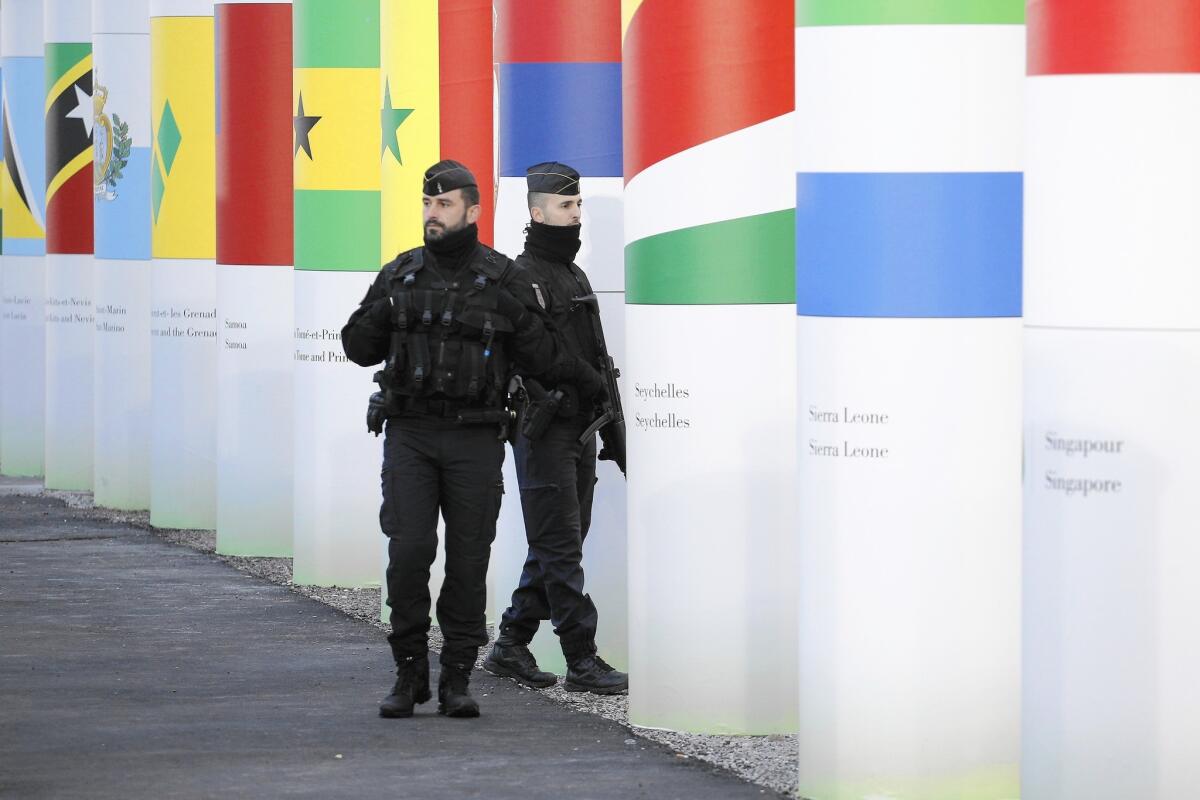Paris climate summit could bring historic deal on emissions, but likely won’t halt climate change

French police officers patrol outside the main entrance of the United Nations Climate Change Conference in Paris.
- Share via
reporting from PARIS — The international conference on climate change that opens here Monday is widely expected to produce a historic agreement among nations to reduce greenhouse gas emissions that scientists say cause global warming.
Laurent Fabius, the French foreign minister, said Saturday that 183 countries accounting for nearly 95% of global greenhouse gas emissions have submitted plans for how they would reduce emissions.
“This,” said Fabius, speaking to reporters at the tightly secured summit venue, “is radically new.”
Yet for all the potential for Paris to deliver a transformative and unifying moment — with diverse leaders gathering in a city shaken by recent terrorist attacks in order to confront a different kind of threat — experts say that on a practical level, it might prove just another steppingstone in the long stop-start international effort to address climate change.
As Fabius acknowledged, the plans of the 183 countries are projected to limit global warming by between 2.7 and 3.5 degrees Celsius — not the 2-degree threshold at which scientists say most of the worst effects of climate change could be avoided.
The likelihood that the current goals will fall short of the 2-degree target is one of many reasons experts emphasize another urgent goal in Paris: to ensure that nations agree to regularly revisit the terms of whatever deal they reach.
“It’s very important that we not lock into place the initial offers that countries have put on the table,” said Alden Meyer, the director of policy and strategy for the Union of Concerned Scientists.
“We need to have, by the end of this decade, an initial review of where we are at and what more can be done to lift ambition,” Meyer added. “And countries need to be prepared to review and revise upward their initial offers.”
The Paris summit is the most highly anticipated environmental gathering in the more than two decades since the United Nations Framework Convention on Climate Change began holding meetings around the world.
At the most well-known of those meetings, in Kyoto, Japan, in 1997, developed countries agreed to binding emissions cuts that would take effect in 2005. The United States, however, never signed the agreement because it was not approved by the U.S. Senate.
Since Kyoto, developing nations have not been obligated to make similar cuts. But that is due to change in Paris, with developing nations identifying their own targets and pledging to meet them.
The shift raises complicated questions about how to determine responsibilities among nations and what richer countries should do to help poorer ones address climate change without hurting their potential for economic growth. Some large developing nations, notably India, where hundreds of millions of people have few options other than to use fossil fuels, present particular challenges.
Yet supporters say the new approach will lead to a more effective agreement.
Robert Stavins, a Harvard economist who studies international climate policy and negotiations, wrote on his blog this month that the earlier distinction between developed and developing countries “made progress on climate change impossible, because growth in emissions since the protocol came into force in 2005 is entirely in the large developing countries — China, India, Brazil, Korea, South Africa, Mexico and Indonesia.”
The Paris conference also comes amid record global high temperatures and drought, extreme storms, shrinking glaciers and melting ice packs — events that have helped make climate science more widely accepted by many, increasing the political will of some leaders to act.
Several countries, including United States and China, the world’s two largest emitters, have entered bilateral agreements to reduce greenhouse gases. President Obama has ordered reductions in coal-fired power plants and auto emissions and this month pleased environmentalists with his decision to reject the Keystone XL pipeline, which would have transported crude oil from Canada’s tar sands to the U.S. Gulf Coast.
Pope Francis has made climate change a priority for the Roman Catholic Church, saying in his encyclical released in June that “a global consensus is essential.”
In September, a group of top Islamic scholars from 20 countries called on all nations, particularly “the well-off nations and oil-producing states,” to reduce fossil fuel emissions and shift to renewable energy.
Environmental groups increasingly are seeking to decrease the use of fossil fuels by trying to slow or halt new oil production, blocking coal and oil exports and pressing for expanded solar, wind and other renewable sources of energy.
K.C. Golden, the chairman of the climate activist group 350.org, said the outcome of the negotiations in Paris “will be a reflection of the world’s resolve to deliver climate solutions at scale, more than a driver of that resolve.”
The United States will be a central player, with Obama scheduled to arrive in Paris on Sunday and stay for two days, and Secretary of State John F. Kerry leading the U.S. delegation in later stages of the conference, which runs through Dec. 11.
The Obama administration supports what its negotiators have called a hybrid agreement in which some of the goals outlined would be legally binding and others would not. The administration supports binding rules that require countries to track and report how they are pursuing their emissions targets but not making the targets themselves binding.
That idea conflicts with the goals of some European nations, which say it is not strict enough. But as with the Kyoto Protocol, an agreement with legally binding reductions probably would have to be approved by the U.S. Senate, which is controlled by Republicans and is unlikely to consent.
In recent days, Kerry has stated emphatically that the U.S. will not agree to binding limits. His comments initially prompted anger from French President Francois Hollande, but Fabius, the foreign minister, later said a hybrid plan could work. He acknowledged the complicated domestic politics in the United States and elsewhere.
“It would be pointless to come up with an accord that would be eventually rejected by either China or the U.S.,” Fabius told the Financial Times.
Todd Stern, the U.S. special envoy for climate change, said in recent days that the administration thinks that by not requiring legally binding targets, chances will increase for a more ambitious agreement that motivates more developing countries to take action.
“We are quite convinced that there are many countries who would be inclined to put in a lower target than they’re really capable of if they were worried about the legally binding nature of the targets themselves,” Stern told reporters.
The conference, coming so soon after the Nov. 13 terrorist attacks in Paris that left at least 130 dead, will take place under a state of emergency, with thousands of police and soldiers fanned out across the country. A major march planned by environmental activists in Paris on Sunday was canceled because of the security measures. But French activists have vowed to find creative ways to be heard.
Groups like 350.org, which has planned demonstrations around the world related to the Paris conference, say they will increase their efforts.
Golden said an agreement reached in Paris would be “more of a report card than a game plan — a measure of the extent to which we have the guts and the brains and the will to wage and win our best and only viable future, a clean energy future.”
He added, “Nobody’s waiting for national governments and the U.N. to ride in on a white horse and save the day.”
Yardley reported from Seattle and Zavis from Paris.
ALSO
Ben Carson, visiting Syrian refugees in Jordan, says he ‘saw pain on faces’
Fortune struck for these Syrian migrants, but can they make it in California?
Poland won’t extradite Roman Polanski to the U.S., ending four-decade legal saga








